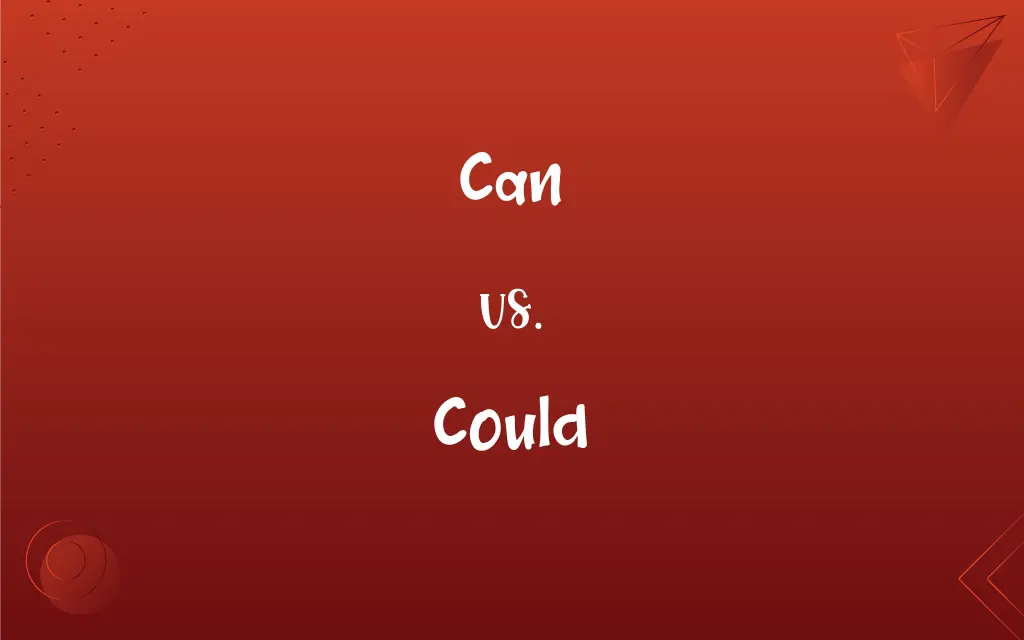Can vs. Could: What's the Difference?
Edited by Janet White || By Harlon Moss || Updated on October 25, 2023
"Can" indicates present ability or permission, while "could" refers to past ability or a conditional possibility.

Key Differences
"Can" and "could" are both modal verbs in the English language with nuanced differences. "Can" is typically used to denote present or immediate capacity, capability, or permission. For instance, if someone says, "I can swim," it means they currently possess the ability to swim. On the other hand, "could" often alludes to a past ability or a conditional scenario. Saying, "I could swim when I was five," points to a past capability.
Both "can" and "could" can be employed to ask for or grant permission. "Can" is more direct and is commonly used in present situations. For example, "Can I borrow your book?" implies an immediate request. Conversely, "could" sounds more polite and slightly formal, such as in the question, "Could I possibly borrow your book?" which comes off as a more tentative or courteous request.
Another contrast between "can" and "could" is their usage in hypothetical or conditional sentences. While "can" denotes a definitive capability or permission, "could" introduces a sense of possibility or potential. "I can finish this work by evening" is a statement of current capability, whereas "I could finish this work if I had more time" underscores a conditional possibility.
"Could" can also act as the past tense of "can," indicating past ability. For instance, "I could lift heavy weights when I was younger," shows a capability in the past. In contrast, "can" is rooted in the present, emphasizing current abilities or permissions.
Comparison Chart
Tense
Present
Past or conditional
ADVERTISEMENT
Typical Usage
Present ability or permission
Past ability, conditional possibility, or polite request
Example of Ability
I can run fast.
I could run fast when I was a child.
Asking Permission
Can I go to the party?
Could I attend the party?
Hypothetical Use
Not commonly used in hypothetical situations.
I could travel the world if I won the lottery.
Can and Could Definitions
Can
To express what is permissible.
You can eat after you finish your work.
ADVERTISEMENT
Could
Past tense of "can" indicating past ability.
He could read when he was three.
Can
To express physical or mental ability.
She can solve complex equations quickly.
Could
To indicate a conditional possibility.
She could go if she finishes her tasks.
Can
To offer something.
Can I help you with that?
Could
To suggest potential.
That could be the solution to our problem.
Can
To indicate possibility.
It can rain later today.
Could
To indicate a possibility in the past that didn't happen.
I could have won the race, but I sprained my ankle.
Can
To ask for or grant permission.
Can I leave early today?
Could
To make polite requests.
Could you please pass the salt?
Can
A usually cylindrical metal container.
Could
Inflection of can
FAQs
Is "could" always followed by "have"?
No, but "could have" indicates a missed opportunity or action in the past.
Can "can" indicate possibility?
Yes, e.g., "It can be true."
Which is more polite: "can" or "could"?
"Could" is often considered more polite, especially when making requests.
Can "can" be used in hypothetical situations?
While "can" indicates present ability, "could" is more common in hypotheticals.
How does one decide between "can" and "could" for permission?
Use "can" for a direct request and "could" for a more polite or tentative one.
What's the negative form of "can"?
"Cannot" or "can't."
How does "could" express uncertainty?
By suggesting a possibility, e.g., "It could be a cat."
Can "could" be used to express doubt?
Yes, e.g., "That could be the wrong answer."
Is "could" always the past tense of "can"?
No, "could" can indicate past ability or a conditional/possible situation.
Are "can" and "could" verbs?
They are modal auxiliary verbs.
In which contexts is "could" most commonly used?
Past ability, polite requests, and conditional situations.
Do "can" and "could" have the same grammar rules?
They share some rules as modal verbs, but usage dictates unique contexts for each.
Do "can" and "could" ever have the same meaning?
They can overlap, especially in questions of possibility or ability, but context determines nuance.
In which contexts is "can" most commonly used?
Present ability, permission, and possibility.
How does "could" function in reported speech?
"Could" often replaces "can" in reported speech for past ability.
Is it correct to say, "I could of done that"?
No, it should be "I could have done that."
Can "can" express an offer?
Yes, e.g., "Can I help you?"
Is "can" used for present abilities only?
Primarily, yes. "Can" denotes what someone is currently capable of.
Can "could" indicate a future possibility?
Yes, especially in conditional sentences, e.g., "It could rain tomorrow."
How about the negative form of "could"?
"Could not" or "couldn't."
About Author
Written by
Harlon MossHarlon is a seasoned quality moderator and accomplished content writer for Difference Wiki. An alumnus of the prestigious University of California, he earned his degree in Computer Science. Leveraging his academic background, Harlon brings a meticulous and informed perspective to his work, ensuring content accuracy and excellence.
Edited by
Janet WhiteJanet White has been an esteemed writer and blogger for Difference Wiki. Holding a Master's degree in Science and Medical Journalism from the prestigious Boston University, she has consistently demonstrated her expertise and passion for her field. When she's not immersed in her work, Janet relishes her time exercising, delving into a good book, and cherishing moments with friends and family.































































